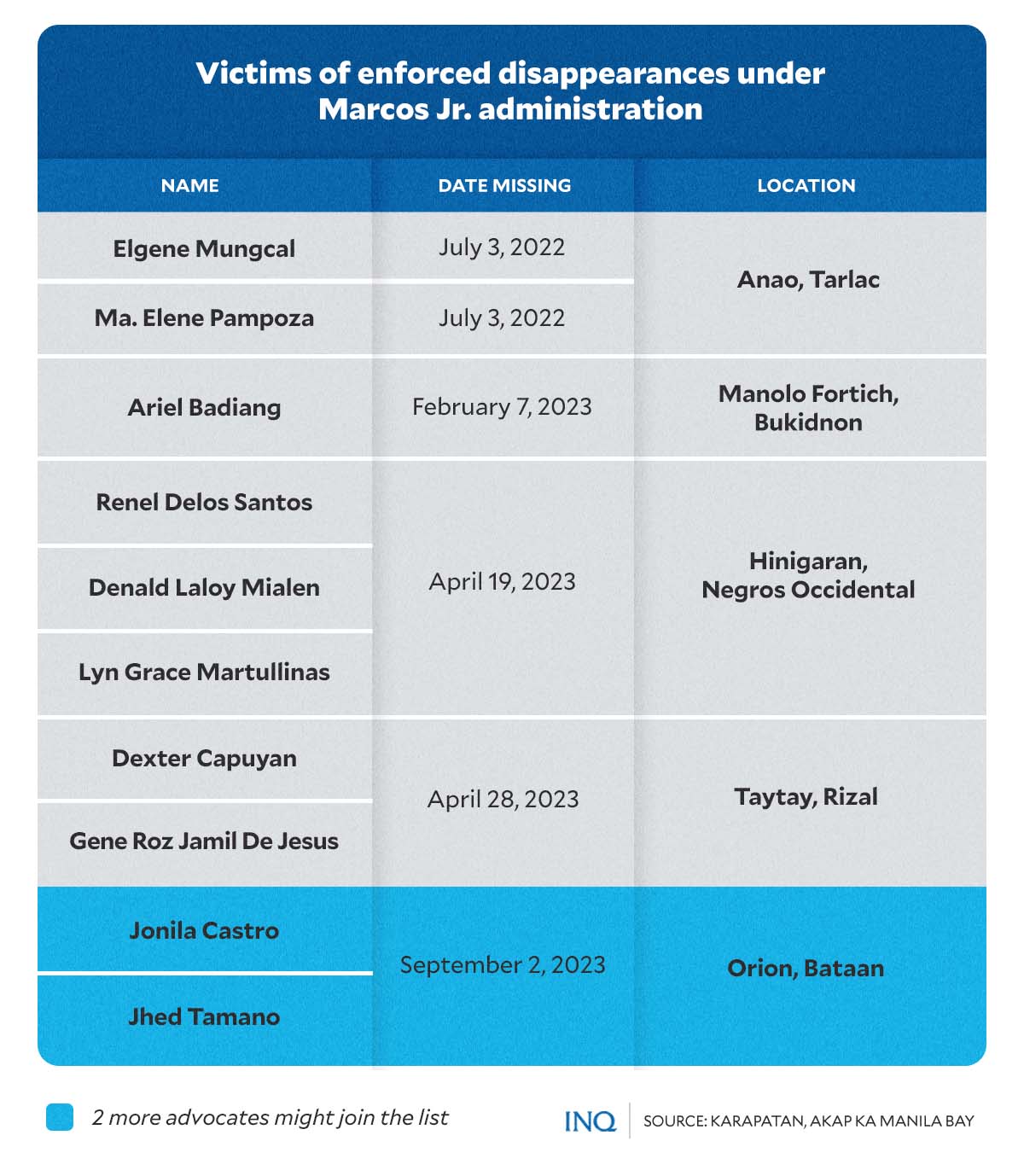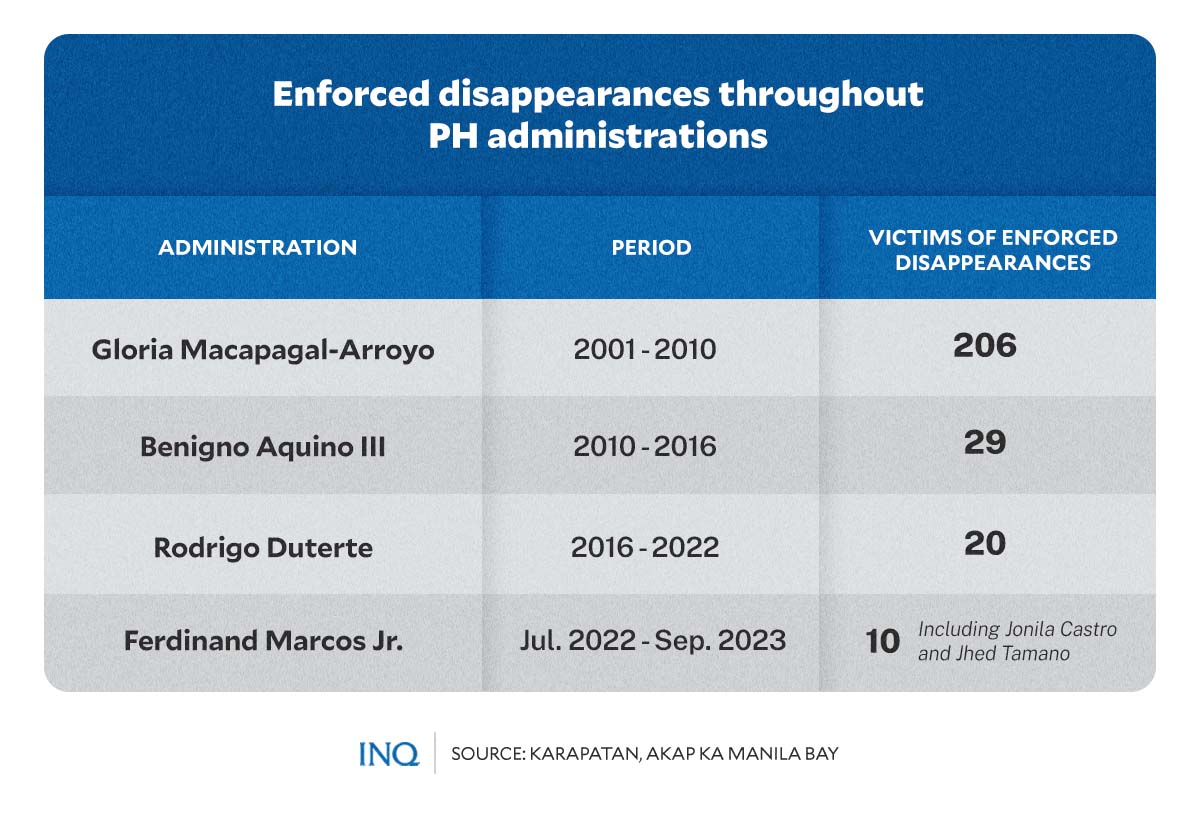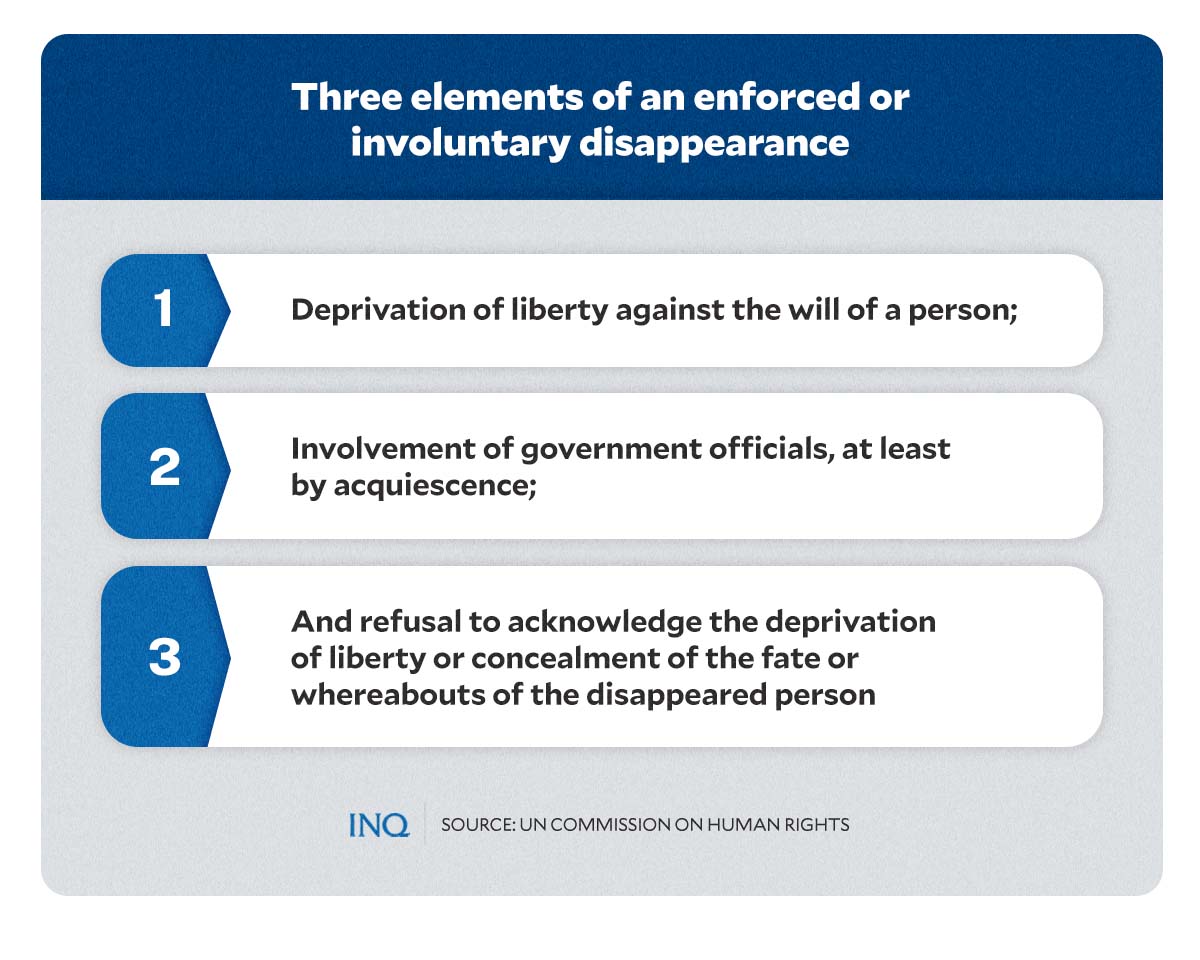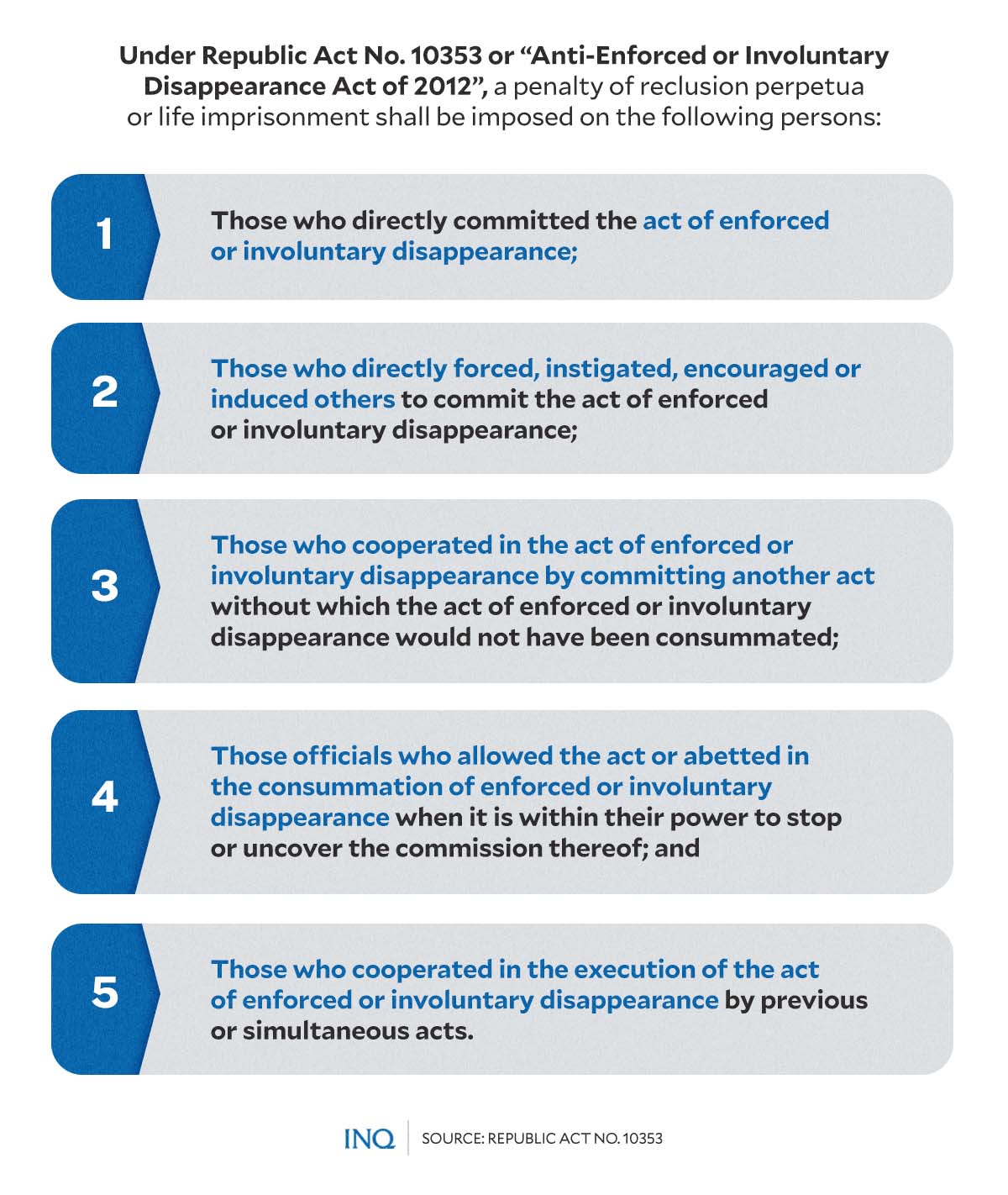Disappearance of 2 anti-reclamation activists sends alarm bells ringing
MANILA, Philippines—Days following the observation of the International Day of Victims of Enforced Disappearances, the list of desaparecidos under the Philippines’ current administration is feared to grow after two environmental activists went missing and believed to have been abducted in the province of Bataan.
In 2011, the United Nations (UN) declared every August 30 as the International Day for Victims of Enforced Disappearances. This was made official when UN member countries adopted the International Convention for the Protection of All Persons from Enforced Disappearance.
According to the UN Office of the High Commissioner on Human Rights (OHCHR), enforced disappearance can be defined as “the arrest, detention, or abduction of an individual by the state or group acting with the authorization of the state, followed by concealment of the whereabouts of the disappeared person.”
International human rights group Amnesty International (AI) added that enforced disappearance is a crime under international law and that victims are commonly tortured, killed, or live in constant fear for their lives.
These people, AI continued, are often never released and their fate remained unknown.
Throughout the years, the UN stressed that enforced disappearance has become a global problem and is not unique to a specific region of the world. It added that enforced disappearance has been frequently used by tyrannical regimes worldwide as a strategy to spread terror and quell dissent.
“Once largely the product of military dictatorships, enforced disappearances can nowadays be perpetrated in complex situations of internal conflict, especially as a means of political repression of opponents,” the UN said.
In at least 85 countries, the UN noted that hundreds of thousands of people have vanished during conflicts or periods of repression.
In the Philippines, families and friends who lost loved ones but are not sure if they’re dead perform a yearly ritual every August 30—light one candle for birthday cakes and another for a memorial.
On September 2, just days after the international day of the disappeared, two environment activists — Jonila Castro, 21, and Jhed Tamano, 22 — were reported missing and were later said to have been abducted by armed men in Barangay Lati, Orion town, in Bataan.
Abducted activists
According to the anti-reclamation network AKAP KA Manila Bay, Castro is a community organizer of the organization, while Tamano serves as program coordinator of the Community and Church Program for Manila Bay of the Ecumenical Bishops Forum.
AKAP KA Manila Bay and human rights group Karapatan reported that the two were on their way to conduct relief operations and community consultation meetings with members of coastal communities when they were abducted by four unidentified armed men.
“Bataan netizens went in uproar as Facebook posts of several concerned citizens, at around 8:00 pm, September 2, claims to witness the violent abductions of then unidentified two young women by armed men, riding away in a gray SUV, just in front of the office of Orion Water District at Brgy. Lati, Orion, Bataan,” said Karapatan Central Luzon in a statement.
“Yesterday, September 3, we confirmed that the said abduction without doubt can definitely be the enforced disappearance of two young women environmental human rights defenders Jhed Tamano, 22, and Jonila Castro, 21,” the group added.
Prior to it, the two volunteers had reportedly already been subject to various forms of harassment, including surveillance.
A pair of slippers and a sandal, positively identified as Castro and Tamano’s, were discovered in the area where they were believed to have been forcibly taken.
As of September 4, the whereabouts of the two missing volunteers remained unknown.
Anti-reclamation advocates
AKAP Ka Manila Bay is a network of fisherfolk, church people, youth, and other sectors dedicated to defending the environment, homes, and livelihoods of coastal communities affected by the Manila Bay reclamation projects.
It is also one of the member organizations of the People’s Network for the Integrity of Coastal Habitats and Ecosystems (People’s NICHE), an alliance of marine and coastal protection advocates who call for the restoration, instead of reclamation, of the coastal waters of Manila Bay and other bodies of water elsewhere in the country.
In a statement, People’s NICHE noted that AKAP Ka Manila Bay is one of the alliance’s community partners in the Manila Bay region and “has been active in opposing the New Manila International Airport in the context of worsening floods in Bulacan.”
It added that the organization also strongly opposes other reclamation programs such as the proposed Manila Bay Integrated Flood Control, Coastal Defense and Expressway projects.
Castro and Tamayo, described as dedicated and committed volunteers, were said to be active in the campaign against reclamation in Manila Bay.
“Being young women environmental defenders also makes them even more vulnerable to such attacks in the already high-risk context of environmental defenders in the Philippines,” said People’s NICHE.
A 2022 report published by the international nongovernment organization Global Witness identified the Philippines as the deadliest country in Asia for land and environmental defenders, with 270 of them killed in the last decade.
“This alarming incident of abduction is the latest incident of an emerging trend of attacks and harassment against anti-reclamation advocates, both in Manila Bay and beyond,” People’s NICHE added.
In a separate statement, environmental conservation organization Environmental Defenders Congress stressed that Castro and Tamano’s situation is doubly precarious.
“Women environmental defenders make vital and distinct contributions to environmental defense, but they are doubly at risk, facing both the general risks associated with environmental activism and the additional risks and challenges related to their gender,” the organization said.
“The attacks against them include gender-based violence, sexual harassment, and attempts to undermine their credibility based on gender stereotypes,” it added.
The UP Diliman College of Science Student Council called the disappearance a “clear manifestation of impunity” that continued under the administration of Ferdinand “Bongbong” Marcos Jr.
International advocacy organization Oceana also condemned Castro and Tamano’s abduction and disappearance and demanded the missing volunteers’ safe return to their families and loved ones as soon as possible and accountability for those behind their abduction.
“This is a sad reminder of how environmental activists are constantly at risk in this day and age. It bears emphasis that the state has a duty to save our coastal ecosystem and fisheries so that the people truly benefit from these important resources,” said lawyer Gloria Estenzo Ramos, Oceana vice president.
“However, the coastal communities and fisherfolk remain marginalized and worst, forced to endure the destruction of the marine environment caused by reclamation, dredging, and seabed quarrying in Manila Bay and other parts of the country,” Ramos said.
“Now that volunteers and organizers like Castro and Tamano are helping them speak out and stop these destructive projects, it is unfortunate and sad that they are subjected to undue harassment and threats to their life and liberty instead,” she added.
‘A very alarming trend’
According to official data from Karapatan, there have been eight victims of enforced disappearances under the current administration.
The victims since July 2022 were Elgene Mungcal and Ma. Elene Pampoza (last seen in Anao, Tarlac on July 3, 2022); Ariel Badiang (last seen in Manolo Fortich, Bukidnon on February 7); Denald Laloy Mialen and Lyn Grace Martullinas (last seen in Hinigaran, Negros Occidental on April 19); and Gene Roz Jamil de Jesus and Dexter Capuyan, who were last seen in Taytay, Rizal last April 28.
Read more: Enforced disappearances of activists show assault on freedoms continues
In an interview with INQUIRER.net, Karapatan Secretary-General Cristina Palabay said she feared that Castro and Tamano will soon be the ninth and tenth victims of enforced disappearances under the Marcos administration.
“We fear that if Jhed Tamano and Jonila Castro will not surface soon, the number will reach ten,” Palabay told INQUIRER.net.
“We find this a very alarming trend considering that it is half of what we have documented under the 6-year rule of [former President Rodrigo] Duterte, in just [14] months under the Marcos Jr. administration,” she added.
Under the Duterte administration, Karapatan recorded 20 persons who involuntarily disappeared.
The group has also documented 206 missing persons when Gloria Macapagal-Arroyo was president for nine years. Almost 30 individuals went missing, too, from 2010 to 2016, or when Benigno Aquino III was president.
In a previous statement, Palabay noted that more than 1,000 people disappeared during the term of the current president’s father, then-President Ferdinand Marcos Sr., and 821 during the term of Cory Aquino.
Read more: Karapatan urges Marcos to help find ‘desaparecidos’
“Enforced disappearances are not just numbers; they represent lives lost, families torn apart, and communities living in fear,” said Palabay.
‘Useless, unproductive’ law
Back in 2012, the Philippines enacted Republic Act (RA) No. 10353, or the Anti-Enforced or Involuntary Disappearance Act of 2012.
The UN said then that “firm and clear political will is an essential element in the fight against enforced disappearance.”
“This Act demonstrates the political will of the Philippines and its people to prevent and eradicate the terrible practice of enforced disappearances,” the UN said.
However, over a decade since the law took effect, Karapatan stressed that enforced disappearances remained a huge problem in the country.
“It is lamentable that despite the existence of RA 10353, enforced disappearances continue because such forms of violations are weaponized with the intent to strike fear and to silence political dissent,” Palabay said.
Under the Anti-Enforced or Involuntary Disappearance Act, a penalty of reclusion perpetua or life imprisonment shall be imposed on the following persons:
- those who directly committed the act of enforced or involuntary disappearance;
- those who directly forced, instigated, encouraged, or induced others to commit the act of enforced or involuntary disappearance;
- those who cooperated in the act of enforced or involuntary disappearance by committing another act without which the act of enforced or involuntary disappearance would not have been consummated;
- those officials who allowed the act or abetted in the consummation of enforced or involuntary disappearance when it is within their power to stop or uncover the commission thereof; and
- those who cooperated in the execution of the act of enforced or involuntary disappearance by previous or simultaneous acts.
However, Palabay emphasized that there has been a lack of accountability for perpetrators. She also said there is still a lack of substantial and appropriate support for relatives of victims and there is continuing reprisal on witnesses and relatives.
These dire situations of injustice, along with the “callousness and brutal mindset of the military and police in meeting their obligations as per domestic and international norms” and the “overall climate of impunity,” she said, “more than undermines the law.”
“The situation renders the law useless and unproductive, which is why having a law isn’t enough. There is a need to strike at the heart of these violations and its root causes on why the policy and practice of enforced disappearances continue to be committed to this day,” Palabay explained.
TSB
RELATED STORIES:
International Day of the Victims of Enforced Disappearances/ Desaparecidos
Remembering desaparecidos: The unending anxiety of uncertainty




